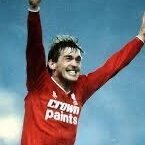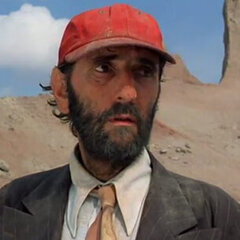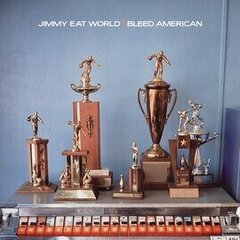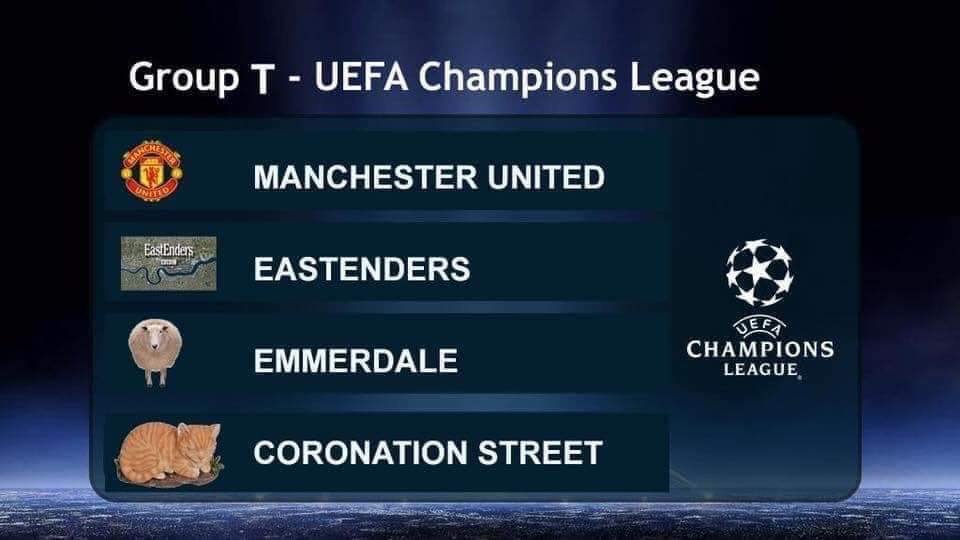Leaderboard
Popular Content
Showing content with the highest reputation on 29/08/19 in all areas
-
So, let me get this straight... 1) Tories put a vote on EU in their manifesto as a cheap ploy to get elected. 2) Tories win and have vote. 3) Tories campaign against leaving. 4) Tories lose the vote, forcing the PM to resign. 5) Tories select new PM, who is shite. 6) Tory's PM tries to get a deal with EU, but get shafted because they're incompetent. 7) Tories can't get the deal passed by parliament, including lots of their own MPs 8) Tory PM steps down because of failure after failure 9) Tories select Boris Johnson as new PM 10) Tories aim to close parliament to prevent stopping No-Deal 11) Labour's fault.8 points
-
The weekend kicked off on Friday night, with Everton having the chance to knock us off top spot. All they had to do was beat winless, newly promoted Aston Villa. An easy task for the big spending Blues, the team tipped by many to be the biggest threat to the big six this year. Well, at least that’s what you’d think if you believed the hype about them. They’re about as much of a threat to the top six as I am to Rafa Nadal’s hopes of winning another French Open. The Blues are what they are. A mid-table side that will never be good enough to be anything more, and probably won’t ever be bad enough to be anything less. They deserved to lose at Villa. They were second best and offered very little. Villa played well and they’ve actually started the season looking very competitive. Unfortunately for them they won’t get to play Everton every week and it’s going to be a slog for them. Everton though. Every year it’s the same. Every year we hear about how good they’re going to be and every year they’re bang average. They’ll win enough home games to keep them in the middle of the table and con their fans into thinking they’re on the right track, but away from home they’ll continue to stink it up. Said it before but it’s worth repeating. Andre Gomes is a massive fraud. I was first alerted to this when everyone seemed to be creaming themselves about him after the Anfield derby. All he did was play a couple of half decent passes while striding around looking handsome. Newsflash, he’s not very good. That’s why he’s at Everton. When you’re that good looking and you’ve got Barcelona on your CV, it’s easy to fool people into thinking you’re better than you are. How the fuck is Richarlison doing it though? He’s never played for Barca and he’s damn sure not handsome. It’s one of life’s great mysteries how he ended up in Brazil’s Copa America squad. I’ve long suspected that they have some equal opportunities scheme whereby shite players are given the same rights as the great ones. Think about it, Brazil’s squads have always been the same. World Class Superstars with a smattering of “how the fuck did he get in there” turds. It’s been like that as long as I can remember. The 1982 squad had Zico, Eder, Falcao, Socrates, Junior…. and some cart horse up front called Serginho. Kleberson actually won a World Cup. And don’t get me started on Fred, Andre Santos, Jo, Afonso Alves, Roque Junior or that fat lad with the cornrows who warmed United’s bench for a few years. Richarlison is a decent Premier League forward. I’m not telling you he’s completely useless and he’s certainly no Dominic Calvert-Lewin, but he’s a 10 goal a season forward who spends so much time lying on the floor he may as well be a fucking rug. Those cheeky bastards are forever complaining on social media about Salah’s diving, when they’ve got this cunt hurling himself around on a weekly basis. I do look at him sometimes though and think he might look good if he had better players around him, but then if he was as good as some seem to think then he should be standing out anyway, surely? Currently the only thing he stands out for is his constant cheating and his annoying face. I took a dislike to him the first time I saw him (opening day against us, two years ago) and my first impressions are usually pretty reliable. So anyway, the Blues had their chance to go above us but their arses went, as usual. They’ve spent so long in our shadow that any time there’s a chance to emerge from it and have a little frolic in the sunshine, they react like an albino and retreat back into the shade. That result was funny but it was topped a day later when United lost at home to Palace. The winning goal came in stoppage time after United had equalised in the last minute. To top it off, after all the discussion that went on after Pogba’s miss last week, Rashford only went and missed a pen! Just absolutely hilarious. There’s so much to this one that I don’t know where to start. Ok, I think I’ll start with Daniel James. What a little prick he’s turning out to be. It was quite a nice story when he got a move from Swansea, but he’s a cocky little prick and he hits the floor quicker than Richarlison. He had more dives than Tom Daley last week at Wolves and that was perhaps in Paul Tierney’s mind when he booked him in this game. Replays showed that he had actually been caught this time, but it’s the boy who cried wolf isn’t it? He’s only been in the league two minutes and his card is marked already. He scored a nice goal to equalise in the 89th minute after United had trailed for most of the game. Now ordinarily, when it’s a game you’re expected to win and you score in the last minute to equalise, you pick the ball up and run back to the centre circle. That’s what United’s other forwards did, only they then had to run back over and drag James away as he was posing with his arms folded in front of the Stratford End. What a tit. You’re not in Kansas anymore, Dorothy. Even Lingard wouldn’t have pulled that shit, and when it comes to posing there is virtually nothing that is off limits to that ballbag. So United were now thinking they might go on and win it, only they got caught in hilarious fashion. Pogba was striding forward with the ball but wasn’t paying attention and was robbed by Benteke. The ball was worked to Zaha who drove into the box, and although he had it nicked off his toe, Van Aanholt had made up huge amounts of ground to seize on the loose ball and fire a shot through De Gea at the near post. Incredibly funny. I like Van Aanholt. I don’t think he’s a particularly good full back as he can’t defend and doesn’t really seem like he wants to, but I like the adventurous streak he has that sees him spending more time in the opposition box than Benteke. As for United. They are who we thought they were. This is why I said in the ‘Week that Was’ when they beat Chelsea 4-0 that it was a good thing, because it would give them delusions of grandeur and make them think they’re better than they are. These were my exact words - United spanking Chelsea 4-0 was great. Why? Because they’re shite but this will make people think they aren’t. Let them get their hopes up. Let them think Maguire is going to be their Van Dijk and that this is the season when Pogba lives up to all of his hype. It’s going to make it all the more enjoyable when it all goes to shit and they lose 3-0 at home to Villa or Bournemouth. Ok so it wasn’t 3-0 and it was Palace, but the point stands. And they still might lose 3-0 at home to Villa or Bournemouth. Chelsea got their first win of the season after edging a five goal thriller at Carrow Road. It was deserved, although Norwich put up a good showing and it was a cracking game. Norwich won’t be involved in too many dull ones. Tammy Abraham scored twice while Mason Mount got the other. Just what Lampard needed really, as he’s putting his faith in some of these young players (partly through necessity, but in fairness Giroud, Batshuayi and Willian were on the bench so it’s not like he had no other choice) and his future at the club will hinge on whether they become top level players or not. The jury is obviously still out on Abraham but he definitely has something about him. He looks like he SHOULD be a really good player, but we’ll see. He already looks better than a lot of the high profile, big money flops Chelsea have signed at the position. Kezman, Shevchenko, Torres, Batshuayi, Higuain etc Mount has started the season brilliantly but it’s getting on my tits how commentators feel they have to give him his full name every time they mention him. It’s because both his first name and surname start with the same letter. You automatically feel like you have to say both because they roll off the tongue. There’s loads of examples, and it’s hard not to do it to be fair. It’s just instinctive. Bobby Ball. Charlie Chaplin. Nina Nana. Dion Dublin. Peter Piper. Frankie Fredericks. Gary Glitter. Yeah I’ll stop there. Norwich were good again though, especially going forward. Defensively they can be a bit open but that Godfrey kid looks like a big prospect. My boy Pukki (that’s right, I’ve made it official now) had a goal and an assist. After last week’s Round Up I received a whatsapp message from a Danish mate of mine (who will remain nameless to spare his blushes later in the season when Pukki bags goal number 20) saying “Pukki is shite. Wasn’t even anything special in Denmark and flopped at Schalke and Celtic” So anyway, Pukki scored again and also set one up, and now he’s officially ‘my boy’. So in your face DT! Oooops, sorry Pete! Watford’s dreadful form continued as they lost 3-1 at home to West Ham. When you’re losing at home to West Ham you know you’ve got problems. They got off to a brutal start when the Hammers were handed an iffy pen inside the first minute. Mark Noble slotted it on his 6000th appearance for the club. It might not be that many, but you’d think it was given how much attention it was given by TV and radio. Watford equalised through Andre Gray and then Will Hughes missed from a yard out. Worst miss we’ll see all season that one I think. It proved costly as West Ham’s new centre forward Sebastien Haller tapped in to get off the mark for the season. He added a second not long after to put the game beyond Watford. £45m he cost, which feels like a lot for a player most of us have never heard of, but I constantly have to check myself these days as £45m isn’t really much anymore for English clubs. Javi Gracia is on thin ice as that Watford board don’t fuck about when they’re on a bad run. Hopefully he comes through it as I like him, he seems like a decent bloke. Meanwhile, up in Sheffield, James Maddison’s beautiful pass with the outside of the foot set Vardy clear and he leathered the ball in with his left foot to give Leicester the lead against Sheff Utd. I loved that. As the ball hit the net you heard him shout “YES!!!” and then immediately cup his ears in front of the home end. Vardy was a Sheff Wed fan as a kid so naturally he milked this one, especially as the home fans had booed his every touch prior to that. He was even taunting them on Twitter later, wishing Wednesday fans a good Bank Holiday weekend and posting a pic of his celebration and an Owl emoji. It wasn’t the winner though, as Olly McBurnie headed the Blades level minutes after coming off the bench. I remember the first time I saw him. He was playing at Anfield for Swansea and I looked at him and said to my Dad “what the fuck is that?”. I still think that when I look at him now. He just doesn’t look like a footballer at all. They paid £20m for him, which again backs up my earlier point about how you don’t get much bang for your buck these days. Another sub, Leicester’s Harvey Barnes, got the decisive goal with a stunning half volley from 16 yards. Great finish that, and Leicester have started well. I said at the end of last year they’d be top six this season and I’ve seen nothing to change my mind, either from them or from the Mancs, whose place they’ll be taking. Chris Wilder wasn’t happy with his players afterwards. I liked what he had to say though. He didn’t want to patronised about how his side worked hard as he said “that should be a given, they don’t get praise for that”. The fans had clapped them off for giving it a go but Wilder wants more than just effort. On Match of the Day Lineker referenced him giving the players the hairdryer treatment and then sarcastically asked Danny Murphy and Ian Wright if they’d ever had that. I really enjoy MOTD you know. You’re not getting the in depth tactical analysis you get from Carra and Neville on MNF, but it’s light and breezy and fun. Some of the regulars are a bit dull (looking at you here, Jermaine Jenas), and Wrighty is probably my favourite of their regular rotation. Murphy is hit and miss but I’ll always have a soft spot for ‘SuperDan’ even when he’s talking absolute Zlatan. He was great talking about VAR last week I thought. The opening 30 seconds of the show this week was superb. Last week Lineker had made a bald joke about Shearer and Murphy and there were actually some complaints made about it. Not sure whether these people were genuinely offended, or just wanted to be dicks about it. Not sure which would be worse actually. Anyway, the show starts this week and once again Lineker is joined by a couple of baldies (Murphy and Wright) and he just reels off about 10 hair related puns in 30 seconds, all the while Murphy is chuckling and Wright is in absolute hysterics. Brilliant stuff and a massive ‘fuck you’ to the whoppers who complained. Bet it was fucking Guardiola, the weirdo. There was another great moment later when Lineker says “Which legendary Palace striker scored twice the last time they won at Old Trafford?” Wright is sat there with a massive grin on his face as Lineker throws us the curveball and says “Yes, it was Mark Bright”. Wright should be on every week, he just makes it more fun. There was a south coast derby at the Amex, where Florian Andone was sent off early on as Brighton lost at home to Southampton. Terrible tackle and Brighton’s manager apologised for it afterwards. There was a clip from before the game where one of Andone’s team-mates bizarrely booted him on the ankle as they were walking out onto the pitch for a look around shortly after arriving at the stadium. He wasn’t happy and maybe he carried that irritation onto the field because it was a cunt of a challenge. Djenepo curled in from 20 yards to break the deadlock. Lovely finish following a swift break led by Ings. Lokadia hit the post as Brighton pushed for an equaliser, but they were caught on the counter again in stoppage time as Redmond tapped in at the back post. Not really impressed with Southampton though. Sunday was interesting, as Spurs were beaten at home by Newcastle and Bournemouth briefly threatened to give Man City a scare. I don’t think anyone saw that Spurs defeat coming. Not because Spurs are playing well (they’ve been awful so far), but because Newcastle have been written off by everyone, particularly their own fans. Not that anyone can blame them. Joelinton got the only goal of the game in the first half with a simple finish. The Spurs defenders just left him on his own. Terrible defending. Vertonghen has been on the bench up to now and you have to wonder just what Pochettino sees in that Davinson Sanchez lad, as I’m just not having him at all. When Newcastle signed Joelinton I initially thought they’d bought some lad called Joe Linton and assumed he was a cut price deal from the lower leagues. It was only later I realised he was Brazilian and cost £40m. I really hope he’s shit just so that Ashley can use it as an excuse to never spend another penny. Not that he needs an excuse mind. They defended well and battled hard for their win, but they rode their luck at times. Spurs missed some great chances and were denied a clear penalty when Lascielles fell over and brought down Kane late on. I can understand Mike Dean not being sure on first viewing, but how is that not being overturned by VAR? I’m not complaining as I’m happy Spurs lost, but that looked a ‘clear and obvious’ pen. I’m pleased for Steve Bruce. I like him. I can’t help it, he’s just always come across as a decent fella. I still want them relegated, but it’s nothing personal against him. Wolves haven’t started as well as many of us expected they would. Perhaps the Europa League is going to impact on their domestic form? Their opponents on Sunday know all about that. Burnley were dismal in the opening months of last season but they recovered in the second half of the campaign and they’ve started well this time. I’m boring myself now telling you all how good Ashley Barnes is. He opened the scoring in this one with a brilliant strike from just outside the box, and he was inches away from slotting another just after the break. Hopefully we keep him quiet this weekend, as he’s the biggest threat to us for sure. Wolves were seriously devoid of any real creativity but Jimenez went close to a stoppage time equaliser when his scuffed shot struck the post. Burnley must have thought they’d survived but then with only seconds to go Wolves were awarded a really soft penalty when Jimenez went down. He calmly slotted the pen to give them a third straight draw. They got out of jail in this one though as they were second best for much of it. Finally, City beat Bournemouth, as expected. The only thing I have to say about this is that Harry Wilson scored a fucking screamer of a free-kick after coming on as a sub, which was nice. Actually I have one more observation on this. Regular readers will know that I struggle to look at the TV when Ederson’s face is on there. He’s just really brutal to look at. Well anyway, he’s now got a skinhead which has made him even more gruesome. He looks like an inmate you’d see being interviewed on “Brazil’s toughest prisons”. Wait, one more thing. Aguero did an interview afterwards in English. Fair play, it’s only taken him seven years to learn the basics. I thought I was lazy, but this guy really takes the piss. Kinell. Right, so I said I’d make my predictions after three games and I will. It’s probably not really long enough to get a proper feel for it, especially with the newly promoted clubs who are still playing on adrenaline as it’s all new to them, but here goes anyway. The title is between us and City, and obviously I’m going with us because how can I not? The rest of the top four will be like a bunch of drunks scrapping outside a boozer at 2am. Arsenal might just be the soberest of them and could nick third spot. Fourth will be between Spurs and Chelsea, and I’ll go with Spurs to just edge it even though I don’t feel strongly about it and would not be surprised if Chelsea pipped them. Leicester will get 6th spot ahead of United. At the bottom, Sheffield United will go I think. The other spots will be between Villa, Newcastle, Watford, Palace, Brighton and Southampton. It could be any of them but I’ll say Villa and Watford, but reserve the right to change my mind and flip flop throughout the season as I usually do. I actually have a sneaky feeling it might be Southampton but I'm not willing to commit to that yet.7 points
-
Hang on. If you’re now saying Corbyn isn’t in power (at the moment) how can you ask what he’s achieved in power? Your trolling is weak. Oh, and as for print money and spend, it won’t work under the Tories. They did it a few years ago and handed the money to the upper echelons so they’d spend and we’d all benefit from the mythical trickle down effect. Most of it was merely invested in shares which benefitted nobody but the shareholders, in effect seeing the biggest increase in the disparity between the rich and everyone else for the best part of a century. For it to work, the money would have to be invested in infrastructure projects led by British firms paying workers who can then go out and spend to boost the economy. The Tories won’t do that. It’ll be snouts in the trough time again. The Tories love people like yourself. Useful idiots who swallow the one nation Toryism line and think they’re part of the club, but haven’t cottoned on that they’re still on the pavement outside, looking in like everyone else.7 points
-
5 points
-
Stop using bits of my personal bucket list in posts, mate. Last time I'm sharing anything with you.4 points
-
3 points
-
What holidays are you going on??? Snooker? "Janice love, can you put some sunscreen on while I try a tricky pot on the brown"3 points
-
3 points
-
It's not the negs (I'm the most negged person in forum history, after all), but the po-faced humourlessness which offends. Nothing wrong with a bit of Maguire every now and again.3 points
-
3 points
-
The mad rush to get on a plane queuing like twats at the departure gate. Your ticket has got your seat number on it, the plane isnt taking off until everyone is on, sit down and chill the fuck out. The mad rush to get off a plane, unless you only have hand luggage you aint getting to your destination any quicker, youve still got to wait for your bags. Twats having a pint at 6.30 am as soon as they hit the airport cos they're on holiday. Same twats later on are in and out of their fucking seats on the plane to get to the bog.3 points
-
I stayed at a place in Majorca last year and they had a girl working there who would walk around the pool in the morning taking all the towels off the empty beds and dumping them in a trolley in the hotel foyer. You’d see people look over their balconies and kick off, then come and put their towels back, only for the girl to come around again every 20 minutes and repeat the process. I thought it was great.3 points
-
Official club accounts giving out shit online bantz. Whoever drew Barcelona in the group stages putting out that they’ll need to practice their corners, for example. Obviously we’ll chuckle at the memory of what that’s referring to, but I’m noticing it more and more and it stinks of Paddy Power try-hard cuntery.2 points
-
Can see it now Squesant cordon bleu cooking away and Crocodile shoes on the radio2 points
-
At the match on Saturday there was a young lad next to me, about 17/18. Dead quiet. Halfway through the second half when Mo was being all cool with the ball out of nowhere he shouted out ‘ I love you Mo !’ Thought that was boss2 points
-
I take your word and i take this post to apologise to lizzie.2 points
-
Been waiting all week for this and it didn't disappoint worth the membership fee on its own a cracking read2 points
-
2 points
-
Lizzie is in my opinion the most humble and affable poster on this forum. It's a genuine honour to have him here. The last thing I'd ever accuse him of is being a Luvvie. The man is a gentleman of the highest order.2 points
-
Explains Peps comments in preseason about winning 7 games to win Champions league, obviously he knew the draw. Too be honest, not arsed about City either way, it is all about us and very happy with our draw.2 points
-
Cracking draw for us that is. No really long journeys into the darkest corners of Europe and some very winnable games. Couldn't have gone much better really.2 points
-
2 points
-
Big Virg should have leaned over to Messi and said still hurting from getting your arses handed to you at Anfield pal2 points
-
2 points
-
Drives me nuts when chaps are playing polo while one jaunts through the gardens of a stately home, gets one's top hat awfully dusty.2 points
-
2 points
-
2 points
-
His fence sitting and fudging of the issue has done as much to run down the clock as the tories. He failed to oppose. He failed to pick his side, whatever it may be (I'm sure some cultist will come back with something about the conference), but it's all been tiptoeing one way and then the other from Corbyn depending on what the situation dictates. He's never said "we shouldn't be leaving." it's all been an if, then and if, then and if, then IF this happens we'll campaign to remain. It's a fucking fudge.2 points
-
The bellend has now deleted his Twitter account. I don't think it went quite as well as he'd hoped.2 points
-
I don't get this. The opposition parties (and most of the Tory party aside from May and close advisers) were deliberately excluded from any involvement in the Brexit negotiations, well until May got desperate at least. The whole affair has been a Tory-run shitshow from start to finish, with multiple attempts to subvert the usual processes in the House, culminating in this ridiculous nonsense right now. At no point until a few months back, have the Tories tried to get consensus that could pass- it's always been about what they want to do- and now it's too late, we've got a hard right bunch of pricks willing to ram it through.2 points
-
May you spend eternity locked in a room, waste high in sea water with 100 lobsters nipping at your nads!2 points
-
It's probably been said before , but you really should be ashamed to be using a great man's picture as your avatar . I'm fairly sure Bruce Springsteen would be appalled to learn you are a fan , you Tory fucking dimwit2 points
-
2 points
-
@Anubis spot on. This complete fuck up will only serve those with little to lose. The average Joe and the ones with scraps already are the ones that are going to be hit. Brexit was nothing more than an opportunity for the fat cats to feed.2 points
-
Rafa Benitez took part in an exclusive Q&A with subscribers from The Athletic. Here are the highlights of the one-hour session… @Mark M: What’s your greatest achievement obviously apart from that Champions League win in 2005? I was answering this question so many times. Valencia winning the league and Europa League, the Europa League with Chelsea was quite difficult, and also I am really proud of Extremadura, Tenerife and Newcastle when we were promoted. You cannot choose just one. There are so many good memories. At Napoli we took two cups from Juventus, that was another achievement so you have to be really proud of all of these things. @Mark W: What did you say to the Liverpool players at half time against AC Milan in Istanbul and what is your favourite memory from your time as LFC manager? I try to explain to anyone who listens to me that my English accent and my knowledge of English at the time was even worse than now! So imagine thinking about what to say when you were 2-0, thinking about what I was going to say, and then we conceded the third goal. The message was clear: Give them some hope, some confidence, tell them that if we score one goal we will be back in the game, and change the tactics to three at the back and two holding midfielders, to control Kaka between the lines with Hamann and Alonso. After we were lucky enough to score goals in a short period and that was a plus for everyone because we grew in confidence, little by little. @Joseph P: Hi Rafa. I’ve read that China plans to win the World Cup by 2050. Based on your ongoing experience of Chinese football infrastructure and player quality, how feasible do you think this is? Everything is going very fast in China. Our team, Dalian Yifang, we are working with 6-10 year-old boys and they didn’t used to play at that age in China. Football is not the main sport in the schools so if they support football in schools now in the way they support ping pong, then they have 50 million people playing ping pong. 50 million! Imagine if they play football in the same way they do with ping pong, then they can compete with anyone. @Conor H: Who was your best ever signing as a manager? Pffft. Let me think about this… It’s so difficult. If I’m talking about my players from my time in England, it has to be Torres, Alonso and Mascherano. If you talk about success and performances at the top level, those players stand out. @Jack G: Do you believe Mike Ashley actually wants to sell Newcastle United? I think I’ve said everything I want to say about the politics of Newcastle. You can read my first column. I want to talk about football now. @Daniel T: How much of a talent is Sean Longstaff & how far do you believe he can go? Since we were in Ireland in pre-season last summer, we saw him doing well and I remember having a conversation with my staff. I remember saying: “It is too early, he needs time.” But we knew he could do well. What impressed me the most was his commitment, he was very keen to learn, and everything that you were saying to him he was trying to replicate on the pitch. We knew that he was playing more offensive and then he could score goals from the edge of the box, but his understanding of the game and his work-rate means that we could use him as one of two holding midfielders. I think that he was good for us in the end and he has a very good future ahead of him. I think he has the potential to play for England but we have to be careful when we talk too much about players and the national team. He is humble, he’s a worker, but football can change quickly so I think it is better to be sure he continues approaching the game thinking about the next one as the most important. @Tom D: Who would win — Liverpool’s 2005 Champions League winners vs Liverpool’s 2019 Champions League winners? I’m really proud of what we achieved in 2005, but I have to say that the 2019 team is stronger already. The team that we had, what we had at this time was great team effort and a lot of character, as well as commitment on the pitch. This team have the intensity and the quality that can make the difference in games. @Dougie W: How did managing in the English Championship compare to the other leagues you’ve worked in? The Championship is more difficult, more physical and more intense. The fact that you play so many games makes it even harder. In Spain, with Tenerife, in the second division when we had Atletico Madrid, Sevilla and Betis — the most difficult year ever — and we were promoted, but I will say that everything then was just ‘football’. The Championship here is not just football, it is a physical battle every game and so it is more difficult for the players to recover and get ready for the next game. It is certainly more difficult than the second division in Spain. I’m so proud of our achievement at Newcastle. @Daniel T: Was there any truth to the Celtic rumours over the summer? I was aware of some interest but we didn’t have any official approach. I was still under contract at Newcastle so we couldn’t even consider this option. @George M: The 4-3-3 was the dominant formation in Premier League football in the not-too-distant past – but now the 5-3-2 (or 3-5-2, however you look at it) appears to have taken over the reins. What do you believe the next tactical innovation to be widely adopted across the league will be? I think that people tried to replicate the 4-3-3 system because the top sides are so strong now. A lot of managers will recognise that one of the best ways to try and stop the top sides is by playing with five at the back because then you have one extra player in defence. The key is the balance. We were playing five in the back at Newcastle, but in attack it is a 3-4-3 formation. That is crucial to find the balance to defend with numbers, and then attack with numbers too. @Reginald A: Rafa, which Liverpool player of the current team would you have liked to have in your 08/09 team? Van Dijk, he would help. Not because the others aren’t good enough but because in this position he is maybe the best at the moment. We had Torres and Gerrard so we had lots of good attacking players, but as centre backs, although I was really pleased with my players, Van Dijk is maybe playing at another level now. @Daniel T: Who is the one player you wish you got a chance to have under your management but never did? Maybe Messi. He is so good that I could maybe just have sat on the sidelines and enjoyed watching him play! When he trained at the Manchester City training ground with Argentina, I had a conversation with him and we spoke the same language — about football, too. @Richard P: Which former player would you liked to have managed? Beckenbauer was my idol, so definitely him. But always when I was young I enjoyed watching Pele. In terms of English players, Kevin Keegan was playing against Real Madrid when I was in Spain and he was at Hamburg — he was a fantastic player and they thrashed Real Madrid in the away game. And, of course, Alan Shearer! @Dan R: How receptive would you be to a return to Newcastle United one day and what would need to happen for you to do so? I like to enjoy the challenge I have now in China. I am always committed whenever I accept a challenge, but I will not hide my feelings that in the future I would like to come back to the Premier League. @Rory S: Hi Rafa, out of all the players you’ve worked with, which player would you consider the most underappreciated by the wider public/media? Lucas Leiva. He was a fantastic professional and very positive for the team. Pepe Reina sometimes does not get the credit he deserves, he was a very important player for us. Also Paul Dummett at Newcastle. He is very consistent and is very clever in a tactical way. He can help the players around him and the fans do not always notice that. @James F: How do you reflect on your time as Chelsea manager Rafa? Was it an easy decision to take the job given the rivalry between Liverpool from 2004-09? It was a very easy decision because it was a top club with top players. What I have to say is that the board, the players and the staff were always very supportive. I think the majority of the fans appreciated what we did at this time. I was really happy to perform and do what we did. I hope that history will look back and see we did a good, professional job and that we were successful. I still have a great relationship with a lot of people there. @Colin W: Would you swap your Champions League win in 2005 to be the first manager to win the Premier League with Liverpool? No, I think you have to accept things as they come. It was a great achievement to win the Champions League after 21 years without Liverpool winning that trophy. You cannot choose one or the other one, you just have to enjoy the ones you do win. @Matt H: Which manager would you say you’re most similar to in football philosophy, José Mourinho? And how would you describe your football philosophy? My idol was Arrigo Sacchi. I was following Maturana, who was the Colombian coach at this time, and then I have my own Spanish background. People say that Marcelino, who is at Valencia, and also Unai Emery when he was there, that they were playing in a similar way. @Daniel T: Are there any other countries/leagues you would like the opportunity to manage in one day? I was close to going to Germany on a couple of occasions. I was watching Bayern Munich and Schalke training and playing games in the past. I would have to learn German because the only sentence I can say is: “Wie geht es dir.” That means “how are you”. @Jonathan H: This summer Joelinton smashed NUFC’s transfer record, with Saint Maximin, Krafth, Willems and Carroll joining him. What’s your thoughts on these signings and how do you think they will perform in the 19/20 season? I’ve already said before I wish Newcastle well for the new season and I hope they have every success in the future. They are good players and they have to settle down in the Premier League, so only time will tell how successful those signings are. @Daniel T: Would you ever consider international management? Yeah. Still I am quite young as a manager. I do like the challenge of managing every week. I have had a few approaches in the past and, in a few years, it is something I may like to do. International management is different to club management and it would be another challenge that maybe I would like to do one day. @Pawel B: Coaches these days don’t get enough time from their clubs. No long-term vision is being seen for the majority of the current PL sides. In your opinion, who (from the current PL managers) could follow the path of SAF or Wenger? It depends on the manager. Guardiola is in the right place to stay for a long time to keep winning. Also Klopp at Liverpool. It depends more on whether they want to. You have some top clubs who will win more than others and they can give more time to their managers. @Liam R: Hi Rafa. Thank you for everything you did and everything you tried to do while manager of Newcastle. We’re all gutted it didn’t work out but thank you for giving us some much-needed hope and respect in our club for 3 years. My question is how important do you think the standard of the Academy and training facilities are in modern football for clubs to progress? When I see how good other Premier League club’s facilities are I worry that NUFC are being left behind on and off the pitch. Also, if you could change one thing about your time at NUFC what would it be? In football now, you can see in England and also in my experience in China, that it is so difficult to sign homegrown players. Players who know what it means to represent a club or a city, and they then have that passion and commitment to the club. Academies are becoming more and more important. To develop your players, to coach them and improve them so that they are ready for the first team is the way to be sure that your team will be working really hard and, at the same time, the business part of football will be right because you will save a lot of money. @Will T: What is the best goal scored by your team when you were managing them? And what is the best goal you’ve ever seen your team concede? One of the best goals scored by one of my teams is Demba Ba for Chelsea against Manchester United in an FA Cup replay. It was a volley, the ball was coming across him and he had to hit it almost like an over-head kick and it went into the top corner. That was in a huge game. The goal that my team has conceded, I think it might be the one Coutinho scored against Newcastle a couple of seasons ago at St James’ Park when he cut inside and curled a shot into the top corner. @Jack G: Hi Rafa, what are the most important aspects of football management in your view? I talk about ‘balance’ in terms of games, and I will talk about balance in terms of how you manage as well. You have to have some tactical knowledge but you also have to have a good staff around you to control the stuff you can’t control. You have to know how to manage them. You have players who are like children in some ways because they are too young and they have too many people around them so you have to advise them properly. Also, with a lot of money being invested in football, the people at the top want results quickly. Keeping the balance between all of these things is the key part of management now. And also the media and the social network now, it goes so fast that you have to approach things with perspective and don’t let yourself get carried away with one thing, just stay calm and analyse things in perspective. @Michael F: If you could change one thing about football in 2019, what would it be and why? Maybe the transfer window. They should be uniform again and the same for everyone because you can see at the beginning of the season now that it is a nightmare for some managers. They aren’t sure if their players are still going to be around. @Connor H: Rafa, thanks for everything at NUFC, got to ask as no one else has, Messi or Ronaldo? Much love x Much love back! They are both great players, each with their own style, and you have to praise both because they have been at their maximum level for so long. The younger players can learn so much from them. @Pitesh M: How close do you feel we (Newcastle) were to ever lifting a trophy or getting back towards European football, under your reign? We lifted the Championship trophy! You can only win the competitions you are involved in. What I always say is that you have to do things right if you want to be competitive. If you cannot then you have to concentrate on what you have and try to get results at the time. We could have done better maybe in some games at Newcastle but overall I think we did the best job we could have done at this time. @Colin B: Do you think there’s a reason (bar a financial one) that English/British players and coaches don’t go abroad as much as their European counterparts? I think it’s more about the culture. The way that you do things here is totally different to how they are done in other countries. When I was in Madrid, Cunningham was there and the way to approach everything was different. I think now the players have more chances to be successful in another country but they are not very keen to go away because the Premier League is a fantastic league, so it’s more difficult to see good English players playing abroad. @Alex H: Hi Rafa. Firstly thank you for everything you did for my club, Newcastle United. Coming from winning division titles and European trophies, how did you find the 2016/17 Championship season differed to those achievements and how does it rank in relation to all your other achievements? I was really proud of this achievement because we knew how difficult it was to achieve promotion and to win the title at the first attempt. I was really pleased because, you can say what you want, but it was a great achievement. The Championship is always competitive, and it was really competitive that year. @Thomas S: Do your family like to visit you in China or do you only spend time with them in Europe? They will come to China because for my family, especially for my daughters, it is an amazing opportunity. China has 5,000 years of culture and history so it will be an experience that they will remember forever. At the moment I am visiting them at home on Merseyside but we are arranging for them to visit China soon. @Hans L: What do you think about the current turmoil at Valencia? How does it affect a manager that there are institutional issues at the club? Many seem to think managers should “just coach the team and accept what they are getting”… Would you return to Valencia? I think they did a great job at Valencia last year and it’s a pity now that they cannot be consistent, doing things that they were doing well last year. Hopefully, they will realise how important it is to do things in a football way and I wish them all the best. I have a very good relationship with the fans, the city and everybody over there. @Noel R: Do you remember the penalty shootout Vs Chelsea in 2007? Why did you sit on the ground during it? I remember it really well. I had the fans behind me and I wanted them to watch the penalties! I knew I was in the middle so I sat down to give them a good view of the shoot-out. @Joshua D: Who was your favourite player to manage during your time in Europe and why? I will say Gerrard. Stevie, he was the captain but at the same time he was a leader by example. I could name a lot of other players because I was lucky enough to have a lot of good professionals working for me, but I would be repeating the same names because when you are a good player and you are professional, then you will be successful so everybody knows you already. @Jay A: Hi Rafa. You had such a strong relationship with the Newcastle players. Were you able to have a proper goodbye with them before you left for China or was there no time? I was in contact with them and I can say that 99, if not 100 per cent of them, we shared messages. Still I am in contact with them. Football is strange in that sense – you can spend years at a club but then you leave suddenly. But that doesn’t mean that you don’t still have a relationship with them. @Jonathan H: Hi Rafa! Who do you think the best up and coming talents are in the game? Mbappe is one of them, obviously. Jadon Sancho is also a very talented young player. There are some names, people can say this one or the other one, but it depends how they react to being famous and keep focused to make sure they progress and keep getting better. @John M: Rafa in 2009 we had a great chance to win the lge. Why did u sell Robbie Keane, which meant we were left relying on El Zhar. Also the thoughts on chasing Gareth Barry, which led to Xabi Alonso leaving. 2 strange decisions that left us in a bad state. Always loved what u did for us but the timing of the 2 decisions left me confused. It was clear that the understanding between Keane and Torres was not ideal and we needed to change that quickly because it was a very expensive signing for us that was not working. Torres was a faster striker and Keane used to play around Berbatov, and they were two different kinds of players. We needed to react quickly to something that was not good enough for the team in the end. The Barry story is something that still people don’t understand. Barry had been playing for years at his maximum level and, at this time, he could play in three positions – midfielder, winger and left back. We had Mascherano, Lucas Leiva and Gerrard with experience, and selling Alonso was a way to make some money and balance the team. Barry wasn’t to replace Alonso, he was to give us something different that we didn’t have at this time.2 points
-
Speaking of taking sleepers on flights. Me and a mate coming back from Thailand at the end of a 3 week party about 20 years ago. Drank the last dregs of our baht out in the airport lounge and had a pair of valiums and a triazolam each in our pockets. Wellied the valiums in the lounge then as we were boarding got the 50ml main course down. Air hostesses came round straight away taking dinner orders and I said no ta because I knew I’d be a goner immediately. Mate is to this day a greedy pig and ordered the works. Last thing I remember is telling him he’d be asleep by the time she’d written his choices down while he mouthed some bravado about being made of sterner stuff than your average. Next thing I knew the air hostess was waking me up and saying we’re at Heathrow. The tablets munched an entire 11 hour flight in one bite, amazing. I came to groggily and looked round to see him fast asleep face-down in his untouched grub. When I thumped him awake he had a mask of sauce and all sorts.2 points
-
2 points
-
Go somewhere expensive and exotic to just to sit by the pool all holiday and never leave the resort. Eat at McDonalds/KFC2 points
-
2 points
-
This is well worth a read, little bit on the history of Otis Redding and Stax but mostly about the recording of Otis Blue The whole album was recorded in 24 hours Talkin' About Heart And Soul: Otis Redding ‘Otis Blue’, and the making of a supernova... CLASHMUSIC FEATURES 18 · 09 · 2015 Otis Redding with Booker T. Jones at a London recording studio during their 1967 European tour with Carla Thomas. © Pictorial Press Ltd / Alamy Stock Photo <> Rome, we are assured, was not built in a day, but over the course of 24 hours across one hot and humid July weekend in 1965, Otis Redding put to tape what would soon be considered his definitive statement - the third of only six albums he would release in his lifetime: ‘Otis Blue’. Think about that: 16 songs in 24 hours, in the can. Conversely, The Beatles’ ‘Rubber Soul’, which followed that December, was a month in the making. Though both stand as apogees of that golden era of mid-’60s simplicity, before studio inventiveness and technology was as crucial as the material, ‘Otis Blue’ triumphs in capturing the immediacy of its creation, and the energy that burned in that single session. That’s why, exactly 50 years later, it has lost none of its potency. It is live and direct. It is alive. It moves your feet; it pulls your heartstrings. It is pure soul, and at the very heart of it is the one man who conceived the entire vision. Otis Redding was more than just a singer; he was a phenomenon. Ask anyone who knew him, and they’ll tell you he was a genius. Then they’ll pause, and repeat the word with added emphasis. Genius. His instincts defined a completely new and individual genre, established his record label as the home of authentic soul, and kicked open the doors to the mainstream, carrying R&B to an international audience. He was the undisputed King of Soul, and was unchallenged for the title right up to his untimely death, aged just 26, in 1967. Otis was the first superstar of Stax Records, whose Memphis Sound is imbued on every disc they issued, but it was on his albums that the musicians truly coalesced - when their autonomy was reined in under his glowing direction - and ‘Otis Blue’ is the personification of the unity and family spirit that made the label so prolific and proficient, and couldn’t have been made anywhere else. Stax did not know how their fortunes would be changed by Otis Redding when he first walked through their doors in 1962, but then again, neither did he. The label was originally launched as Satellite Records in 1957 by fiddle player Jim Stewart to release country and pop records. His first studio, in Brunswick, Tennessee, required professional recording equipment, which he could not afford, and so his sister, Estelle Axton, mortgaged her house to acquire the funds, and became a partner in the business. Success, however, eluded them, and Stewart’s productions floundered. Tentative forays into R&B, steered by staff producer Chips Moman, signalled a new and interesting route for Satellite - especially as it led the label back to the root of that particular musical tree: Memphis. “Memphis often calls itself the shipping centre of America, so the crossroads of America,” says Rob Bowman, author of Soulsville, U.S.A., the authoritative tome on Stax. “If you put a pin in the map and you draw a 200-mile radius around Memphis, you’ll hit Nashville to the east, 200 miles south you hit Jackson, Mississippi, about 120 miles west you’ll hit Little Rock, Arkansas, and about 300 miles north you’ll hit St. Louis… Memphis was the major city for African-American people for a wide swathe going north, west, east and south. And particularly significant, of course, was the fact that heading south took you right down to the Mississippi Delta. Memphis was the big city; if you wanted to make it, you went to Memphis.” - - - Otis Redding (© Pictorial Press Ltd / Alamy Stock Photo) - - - Once a major slave trading centre, Memphis became a post-war boomtown for cotton and lumber, attracting immigrants from around the country, who brought with them their own singular culture, creating a hotbed of languages, religions and, most pertinently, sounds. The city was a magnet for African-American culture, and it was here that WDIA, the first black-oriented radio station in the United States, first aired in 1947. Its 50,000-watt signal is believed to have eventually reached almost a quarter of the American black populace. Riley King earned the nickname ‘Blues Boy’ from his show on the station, later abbreviating and adopting it for his stage name, B.B. More stations followed, the sound of the south becoming readily available on the nation’s airwaves, and Memphis was the melting pot of a range of indigenous Delta-flavoured styles. Elvis Presley grew up listening to the strains of gospel and blues on his local station and forged these influences to produce rockabilly and, in turn, with the revolving door of talent passing through Memphis-based Sun Records, rock and roll was born. Considering the deep racial tensions of Memphis - a heavily segregated city - radio played a pivotal role in exposing otherwise unavailable music to a young, hungry and, crucially, white audience. Jim Stewart would eventually find himself surrounded by such inquiring minds. Charles “Packy” Axton was only really invited to join The Royal Spades because the band knew his mother, Estelle, owned a recording studio. The group, which included childhood friends Steve Cropper and Donald ‘Duck’ Dunn, on guitar and bass respectively, were teenagers infatuated with R&B. “They’re playing all black music, because they’re hearing WDIA,” explains Rob Bowman. “They’re part of that first generation of white kids growing up with a black radio broadcasting sounds from across the tracks, if you will, all day long that they can access in a way that no previous generation has been able to access it, and they’re just lapping it up. They’re loving the stuff.” - - - - - - Upon Satellite’s move to a former movie theatre on McLemore Avenue, Stewart used members of The Royal Spades as the house band - the label’s first recording was of local radio DJ Rufus Thomas and his daughter, Clara. Their single, ‘Cause I Love You’, marked the beginning of a relationship between the label and Atlantic Records, who distributed the record, that would later have serious repercussions. The Royal Spades, meanwhile, had long chased for their own opportunity to record, but when their big chance finally came in 1961, it was with some serious compromises. Chips Moman, who saw more potential in the group than Jim Stewart, took their horn section - “Packy” Axton and Wayne Jackson - and drafted in local black musicians to enhance their sound. Floyd Newman, for example, was added on baritone sax, while bassist Lewie Steinberg replaced Dunn, who was away fishing that day. The final single, an instrumental 12-bar blues called ‘Last Night’, was released in 1961 under the group’s new name, The Mar-Keys. ‘Last Night’ became a national hit. The resulting attention led to an already-established Satellite Records in California challenging the small Memphis label to change their name. Stewart and Axton put their heads - and surnames - together to form Stax. - - - - - - Stax was unique from the beginning. McLemore Avenue was formerly a white community, but was rapidly transitioning into predominantly black, but Stax - or, more accurately, the Satellite record shop in the former cinema’s foyer - was a beacon for musicians from all walks of life. The staff would meet, talk and get to know their visitors, and gradually new talents were discovered and incorporated into the house band. By 1962, Cropper and Dunn had teamed up with newcomers keyboard player Booker T. Jones and drummer Al Jackson, Jr. to become Booker T. & The MG’s, who’d serve as the core house band as well as an instrumental group in their own right (‘Green Onions’ was their first hit, later that year). When Jones was absent he would be replaced by pianist Isaac Hayes. Later, the label’s main production pool - ‘The Big 6’ as they were referred to - would comprise of Cropper, Dunn, Jones, Jackson, Hayes, and his songwriting partner, David Porter. In addition, the house horn section, whose fluid brass tones were a distinctive voice of their own, consisted of Wayne Jackson, Andrew Love and Floyd Newman. One day in 1962, the Stax staff were assembled in the studio for another session, this time for blues guitarist Johnny Jenkins. Steve Cropper was outside having a cigarette when his car pulled up, and the driver began unloading instruments and microphones. “I said, ‘Hey, you don’t need to bring those in. We’ve got mics in the studio,’” Steve recalls. While the session with Jenkins proceeded, his driver took the opportunity to harangue Al Jackson. “He came and begged Al Jackson, ‘Please listen to me sing,’” Steve continues. “Al said, ‘I don’t audition people. Steve does, but Steve handles auditions on Saturdays. I don’t know if he’ll have time.’ So, after the session with Johnny Jenkins, trying to get him an instrumental, Al came to me when we were listening to the playbacks after the session. Most of the guys were leaving to go home. He said, ‘That guy has bugged me to death. Would you please take two minutes and listen to him to get him off my back?” The driver was invited over to the piano, where he asked Cropper for “some of those church chords” to be played while he sang an original song, ‘These Arms Of Mine’. “I promise you - I promise you - that the hair stood up on my arm. I could not believe his voice,” Steve says. “I said, ‘Hold it right there!’ He said, ‘What’s the matter, you don’t like it?’ I said, ‘No, just hang on - Jim Stewart’s got to hear this.’ I said, ‘Jim, I know you’re busy listening to this stuff, but you’ve got to come and hear this guy’s voice.’ To us, it was a brand new discovery. I mean, why had somebody not really heard him before like how we heard him?” In Soulsville, U.S.A., Rob Bowman suggests Cropper’s apocryphal story of Otis Redding’s discovery may be slightly more calculated. Otis was, after all, the vocalist in Jenkins’ group, The Pinetoppers, and the pair shared a manager in Phil Walden, who perhaps engineered the fortuitous audition. Either way, it earned Redding a contract with Stax, and ‘These Arms Of Mine’ was an incredible opening gambit in a career that had been building steadily for a few years. - - - - - - Otis was born in Dawson, Georgia, in 1941, moving to Macon three years later. He sang from an early age in the Vineville Baptist Church choir, at school, and on local radio, and was famously asked to stop entering a local talent contest after winning it - and claiming the $5 prize - 15 times in a row. It was here he met Johnny Jenkins, who recruited Otis into his then group, Pat T. Cake and the Mighty Panthers, and later The Pinetoppers. When he was 19, Otis met his future wife, Zelma Atwood, at a party. From the start, she saw the determination in Otis’s eyes, and supported his efforts. “Otis’s ambition and what he wanted to be and what he did and his dreams was always positive,” Zelma says, “because nobody could tell Otis Redding that he was not going to be successful, that he was not going to be a big figure, but I don’t know whether he thought he was going to be a big star. He didn’t have that type of arrogance about him. He knew he was good at what he did, but he wouldn’t put himself [out there] like these artists today. I would always tell him that he was a great singer, and he would tell me, ‘Well, I’m not that good; I’m just trying to make a living doing what I love to do.’ So, I don’t think Otis Redding had the arrogance and the mindset of how great a person and how great an entertainer that he came to be.” Phil Walden began managing Otis when he was still a gigging singer. The belief Walden had in Otis was palpable from the off, while the impact of the pair’s friendship on each was effective on both a personal and professional level, as would be evident in later years when Redding’s business acumen prospered in various fields. “I think Phil Walden was very significant,” Rob Bowman states. “We’re dealing with a different time and place, and it’s a time and place where race and racism is an inescapable fact that dominates life in every respect, certainly very much in a place like Macon, Georgia, and Memphis, Tennessee. So in some way, a guy like Otis having a white person coming out of a middle-class background like Phil Walden, is at least a massive advantage, if not a necessity in that time and place, to be able to open certain doors and make certain things happen. In fact, when Phil was still alive he told me that at one point he couldn’t afford the tuition to complete his university degree. Otis, I believe, paid the money for him - this is when Otis isn’t getting anywhere; he was still just gigging - but Otis’s attitude was, ‘Look, I have the talent, I need you to get the education to know how to do the business.’ Otis understood how society works - what things Phil Walden could bring to the table that Otis could not have easily have brought to the table. And Phil Walden very much understood the genius of Otis Redding and what Otis could bring to the table that Phil could never bring to the table. The two of them were a very, very smart partnership.” Walden was in charge when Otis signed to Georgian label Confederate Records, releasing the single ‘Shout Bamalama’. The visit to Stax was intended to find a home for his other client, Johnny Jenkins. When Stax signed Otis to their Volt imprint, he was still under contract to Confederate. Its owner, Bobby Smith, amicably sold the contract to Stax, and claims today that the original recording of ‘These Arms Of Mine’ was actually made by Confederate. Nevertheless, it was with Stax and that single that Otis’s fate was sealed. “It started everything,” Zelma beams, recalling the preceding “nine months of starving, nine months of living in a two-bedroom apartment, nine months of having nothing, nine months of having no success, and not even a dream that this would happen.” ‘Pain In My Heart’, Otis’s debut album, was issued by Atlantic on their Atco subsidiary in January 1964. It gathered together the product of a number of sessions from 1962/’63, which reflected Redding’s live performance at that time. The title track, a reworking of Allen Toussaint’s ‘Ruler Of My Heart’ (a hit for Irma Thomas), immediately establishes Otis as a powerhouse of emotion; his visceral cries to “come back, come back, come back” and “love me, love me, love me” inject pure gospel fervor into his sweet R&B. As stirring physically as he is emotionally on the album, tracks like ‘Louie Louie’, ‘Security’ and Little Richard’s ‘Lucille’ demonstrate Otis’s ability to pick up the pace. The latter, in addition to his cover of Sam Cooke’s ‘You Send Me’, was his tribute to his two biggest vocal influences, an accolade he would continue throughout his life. “If you took a jar of Sam Cooke and a jar of Little Richard and shook ’em up and poured ’em out you would get Otis Redding,” Steve Cropper explains. “When he sings a ballad, he’s singing it almost like Sam Cooke would sing it. When he’s singing an up-tempo dance song, he sings it almost like Little Richard would sing it, that energy. Little Richard was always about energy, and Sam Cooke was always about the crooning, the softness.” - - - - - - Otis’s reputation on stage was electric, and his albums served to increase his audience and keep him almost permanently on the road, but Stax was a home for him, and the people who worked there - as each will testify - were one big family. “When they saw those artists walk in there,” Zelma says of the Stax staff, “it was like their eyes would glow. It was like it was a family member walking in. And it wasn’t about money. It was about the love of what they were doing. I was there, and I know. I have always been a great judge of people, and it wasn’t about money. You take these artists today - they make a lot of money - but you take those artists back then, they didn’t make no money! Half of the time it was a handshake. They just wanted to do what they loved to do, and that was make music. And it was a family.” The Stax methodology was wholly organic, where freedom reigned and the pursuit of perfection was the objective. “Jim Stewart was a perfectionist,” says Al Bell, who’d play a crucial role at Stax after joining in 1965. “I don’t mean that to say that it had to be absolutely perfect, but Jim Stewart would keep those musicians in that studio playing as long as it was necessary until he knew and felt that they had captured the groove and its authenticity, and where he could get to the point of recording and capturing the magic of whatever that moment was. It was something about him that let him know, ‘That’s it!’ And in between takes, he’d have the musicians come into the control room and listen, and they would talk about how Steve was playing the guitar, how ‘Duck’ was doing the bass, or Al doing the drums - all of that - and he wouldn’t stop until that magic moment was captured.” Having kept a close eye on Chips Moman, Steve Cropper acquired many of the producer’s techniques - as well as a senior standing in the company - when Moman left Stax in 1964. Cropper had helped build the studio, and now he was writing and producing the label’s biggest stars. “We kinda learned by doing on-the-job training,” the guitarist confirms. His promotion was typical of the autonomy in which Stax staff worked, and the resulting independence had two huge consequences. Firstly, the intimacy the musicians enjoyed meant that the intuitive and spontaneous grooves were easily conjured and captured, and the sonic quality recorded in that small studio shone on record. If you talk about the early-’60s Stax sound, what immediately comes to mind is a rich, warm tone, where tight rhythm sections lead and cut a deep groove. When asked by Clash in 2010 the difference between Stax and Motown soul, Larry Dodson, vocalist for Stax group The Bar-Kays, said: “Motown was the glitz and the glamour. Stax was the collared greens, the neck bones, the corn bread, and the stuff that sticks to your belly.” Stax’s unique sound is attributed to the diversity of its creators, of course, but also to the shape of the studio itself. The studio was almost two-thirds of the original movie theatre, and retained its low ceiling and sloped floor. “The sound was there to be used,” Floyd Newman verifies. “When they built the movie theatre, it had to be acoustic-made. Of course, they had to carpet the walls, which enabled it to be more dynamic. And it was compact, let me say that.” Other parts of the building further added to Stax’s natural resonance. “We had to use the ladies bathroom as an echo chamber,” Steve Cropper laughs. “The men’s bathroom had been taken up by the Satellite Records shop, but we still had the women’s bathroom, and so we put a speaker in the board and hung a mic down from the ceiling. That was our echo chamber, but it worked!” The second consequence of the familiarity within the ranks at Stax was the fraternising between the races, which was unheard of elsewhere in Memphis. For reasons beyond their control, race relations would cause serious turmoil in the city in 1968, but in the first half of the ’60s, the integration at Stax was natural and based on achievements through a shared passion. Once through those doors, the Stax musicians became colour blind. “It was true for all of us,” says Wayne Jackson. “Once we integrated into the Stax programme, there was no colour.” “I’ve always said that when going to Stax, it was sorta like going into church; you leave the outside outside,” Steve Cropper adds. “You don’t bring your problems and all that inside, you’re there with a lot of respect, everybody’s treated equal and everybody’s there for the same reason, and so there was no clash of anything. Even if you have a brother that you argue with all the time, if y’all go to church you don’t argue in the church. You started again when you got outside,” he laughs. “Everybody had their problems, but that wasn’t one of ours.” “[Stax] became our oasis or our haven, because it allowed us to escape all of the segregation and racism outside,” says Al Bell. “When we left Stax and went back to our communities, the blacks went back to the black community and the whites to the white community… When we left and went out that door, then we went into a different world, but inside of Stax it didn’t exist.” - - - Otis and The Bar-Kays, December 1967 © Everett Collection Historical / Alamy Stock Photo - - - “It’s not like Jim Stewart thought, ‘You know, to heck with this. I’m going to integrate my company. I don’t care what the norm is in Memphis,’” Rob Bowman points out. “He never planned that, it was never his goal; he just wanted to make records. And initially he wanted to make white records, because that’s all he knew. He stumbles into working with black musicians because of where he rents his studio. It organically happens that some of the black guys started replacing some of the white guys he knows, and suddenly he’s got an integrated situation at hand. Jim, and you’ve got to bless his soul for this, has been brought up by parents who’ve taught him that black and white are equal, so he does not have ingrained in him a lot of the racial biases and attitudes that were endemic to many people in Memphis at that time. And the main thing that nearly everybody has told me is that this basically happened under the radar. Not deliberately - nobody’s hiding anything - but because it’s a small little mom and pop operation that very few people outside of the immediate neighbourhood even know about. So any sort of reaction or backlash they might have got from Memphis authority figures - police, politicians, social commentators - man, nobody even really knew about it or cared. It didn’t mean anything. It was only once it started having hit records that it meant anything.” Throughout 1964 and into ’65, Stax picked up steam, putting out cuts by William Bell, Rufus Thomas, Booker T. & The MG’s, The Mad Lads and others. Although the records sold well, chart placings were significantly improved after Jim Stewart formally reinforced the label’s partnership with Atlantic, agreeing a national distribution deal with the major. Jerry Wexler also brought Sam & Dave to Memphis, endowing the dynamite duo with Stax’s gritty southern backing, but retaining their releases for Atlantic. The musicians in the studio were engaging in endless fertile and exploratory experiments, growing in confidence and developing individual and collective abilities. “[We were beginning to find out] what our strongest points were,” David Porter enlightens. “Just as it was impacting the audiences publicly, it was also impacting us, because we were finding out there were some things that were inside of us that we didn’t know had that kind of possibility to it, and that just was discovering going on as we were recording the product… To be able to see the results of something - hear the results of something - and be impressed with it, gave you more energy to try something that was of the same kind of impactfulness, and then when you would do that, it would give you the motivation to try something else and not [lose] the essence of the impact of what you’ve seen that could be powerful for you. And so, that was the discovery that enabled the music to have different characters to it, even though there may be, in many cases, the same guys playing it.” Otis, meanwhile, found himself in demand for live shows - his vibrant stage presence multiplied his energy on record - and committed to a tiring schedule that criss-crossed America. “He was getting a whole lot of exposure and he had to travel a lot,” says Zelma Redding. “I mean doing one-nighters, travelling miles and miles away, riding in a car with the vans of equipment behind him.” His visits to Stax studio became rarer, but in March 1965, with enough material amassed from sessions dating back to December ’64, his second album, ‘The Great Otis Redding Sings Soul Ballads’, was released. The title plainly addressed the burning talents Otis possessed to wring a slow song dry of every emotion - his voice reaches deep down inside the listener, wraps itself around the heartstrings, and tugs earnestly. The 12 tracks on ‘…Soul Ballads’ included five Otis originals. The febrile intensity of Roosevelt Jamisons’s ‘That’s How Strong My Love Is’ is easily matched by Otis’s ‘Come To Me’, while his ‘Chained And Bound’ sat effortlessly beside fellow heartbreaker Sam Cooke’s ‘Nothing Can Change This Love’. The passion he wrought in those signature 6/8 rhythms suggested a solemn and lovelorn individual, but in reality, Otis radiated warmth and joy. “If he came in the room, he would light you up,” notes Wayne Jackson, “and if he touched you, you would become magic.” Noting with irony that false impression of Otis and his predilection for sad songs, and using a nickname given to him by a radio DJ as inspiration, Steve Cropper collaborated with Redding on the song that closes the album and plays up the image: ‘Mr. Pitiful’. “They call me Mr. Pitiful / This everybody knows,” the verse goes, “They call me Mr. Pitiful / Almost everywhere I go.” “He was easy to write about, because he was such a colourful person,” Steve says. “When Otis would write a song by himself, a lot of his songs were about his fans, about the people who were listening. When I wrote, I was writing about Otis, so it was more of a personal kind of thing, I guess.” - - - - - - Cropper and Redding would develop a close working relationship, but while opportunities to convene and write together were scarce (“We were really still just getting to know him in the studio,” Steve admits) they made the most of whatever time alone they did get, giving Steve the chance to get to know Otis better. “When Otis would come to town, Steve would get together with Otis and go to the Lorraine Motel, which was the black motel, and that’s where they would sit up and write songs,” Al Bell reveals. “It was two guys getting into a hotel room by themselves and coming up with ideas and sharing ideas and coming out the next morning or later that night with a couple of songs that you could go in the studio and cut the next day,” Steve says of such occasions. “We would write all night long and I would see the daylight coming through the window and I would say, ‘Otis, you better get a shower, we gotta be in the studio at 10 o’clock!’” he laughs. “It was magic between Steve and Otis,” says Al Bell. “Otis played acoustic guitar - he wasn’t the greatest guitar player in the world, but he played - and Steve played guitar, but Steve and Otis could interact with each other and, in many instances that I have observed from afar, hear what each other was thinking about before they opened their mouths. It was just that close between the two of them.” Otis’s time was at such a premium in 1965 that, when Stax required he return to make his third album, he could only spare one day. Despite his records’ success, and due to a low royalty rate from Atlantic, Otis’s main revenue came from the road, so pit stops were kept a minimum. “Otis was unique at the time,” explains Rob Bowman. “James Brown was the only other black artist selling substantial numbers of LPs. Jerry Wexler of Atlantic Records told me that, at the time, if you sold 30,000 copies of a black LP, you had saturated the market. White albums were regularly selling several hundred thousand copies, right? We’re not quite in the time of multi-platinum records yet, although The Beatles are beginning to show the way to that. But Otis and James regularly would sell 200-300,000 copies. It might be over months or even a couple of years, but their albums did bigger business. So Stax, by the time of ‘Otis Blue’, had obviously twigged onto that, and wanted an Otis album as soon as they could get one.” Aware of the urgency and his own incessant agenda, Otis arrived that July weekend fully prepared to fulfil the brief in the allotted time. His song choices for what would form ‘Otis Blue’ and the visions for each were completely realised before the musicians even knew what hit them. “When Otis would walk in the door of the studio, Otis had already worked out in his head every word of either one of his songs, and what music should be played behind them,” remembers Floyd Newman, who found himself given instructions by the singer. “Otis just loved horns,” Zelma smiles. “He couldn’t read music, and he couldn’t write it, and when he went into the studio, to see him work was amazing. Because every horn line that he wanted the horns to play, he would tell them with his mouth. He had in his mind always what he wanted.” The house horns, says Floyd Newman, typically enjoyed authority with horn lines, but had absolutely no problem recreating Otis’s dictations. How could they, when Redding’s effusive personality was so overwhelmingly endearing? “He would come in with a big smile on his face. Hey, he was just relaxed, man. When he was coming, they’d say, ‘Hey, Otis is coming!’ ‘Wow, man! We’re gonna have a good time! We’re gonna enjoy ourselves!’” he laughs. “We didn’t have to do no songs over and over again - you didn’t have to do that with Otis, because he was already playing what he wanted, and he knew what he wanted. And you enjoyed doing what he wanted you to do. So it was happy sessions.” Such conviviality was not restricted just to the musicians, as Al Bell attests. “When Otis hit the building, the positive vibe just exploded, because Otis was Otis, and he interacted with everybody - the secretaries, the people in the mailroom: Otis was here! He just loved everybody, and that’s the spirit that they all felt, and he accelerated that whenever he came.” Present in the studio that fruitful day alongside Newman on baritone sax was Wayne Jackson and Gene Miller on trumpets and Andrew Love on tenor sax. The MG’s - Booker T. on keyboards, Steve on guitar and production duties, ‘Duck’ on bass and Al on drums - provided the core, while Isaac Hayes contributed additional keyboards. William Bell and Earl Sims, a friend of Otis’s, helped out with backing vocals. Atlantic engineer Tom Dowd was on hand, while Jim Stewart witnessed what went down. The aim was to preserve on tape the energy being generated within the walls, and the musicians pushed and supported each other to match Otis’s dynamism. “Otis was an original,” confirms Wayne Jackson. “He put us all on guard to be original with him.” The arrangements for his original songs - of which there are only three on ‘Otis Blue’, since Otis had no time to write new material before notice of recording - had largely been determined beforehand, but since the remainder of the album was to be filled out with cover versions that Otis had just brought to the table, arrangements were conjured up in an instinctive group effort, with the notable help of Booker and Isaac, whose advanced musical skills abetted distinctive translations. “So we were all in there ad libbing together on a song that sometimes we had never played before,” Steve says, “some of the guys maybe had played versions in a club somewhere, but that was about it… So we head arranged, and what we would do, we would run the tape, and a lot of times I would come up with a riff and put it on the end and I would say, ‘Guys, can we use that riff for the intro then we hit on it during the song?’ Instead of starting at the top and working our way down, which we had done many times, a lot of times we would get to the end and this repetitive lick would come over and over and over, so we would go to the front and put it on the intro.” The music and vocals were recorded together live. Steve debunks the myth that Otis’s parts on the album were caught in one take. “When you say “one take” - thetake, yeah,” he laughs, “it might take us eight takes to get it, but we would do it.” “There were,” David Porter adds, “no instances where the artistic passion was lost in any take that Otis would do,” stating that with every successive effort, Otis delivered maximum feeling, singing “the pure essence of the emotion of that song” each time. The vitality of the moment was paramount, and Otis was the power source from which everyone fed. “Otis was constant motion,” Wayne Jackson notes. “He never stopped dancing and moving. So it was very interesting, especially for young guys who couldn’t wait to dance. Otis danced, and we danced. The studio was in constant motion.” Whether the musicians succeeded in realising Otis’s visions was determined by one obvious observation. “If you could see me right now, you could see what Otis would always say,” Floyd Newman demonstrates. “He had a little thing; he would say, ‘If your shoulders don’t do this’ - I’m moving my shoulders up and down - he would say, ‘It’s not a hit.’ That was Otis,” he laughs. “And he was always right! He would sit and listen, and if you don’t see him with his shoulders going up and down, hey, ‘No, that’s not the cut. Let’s do another one.’” This method of interpretation, and Otis’s inimitable vocal readings, justifies the esteem in which ‘Otis Blue’ is held, despite the fact that 70% of the material is covers. “Every song that Otis Redding covered, you could say he owned it, because he never was going to do it the way it was done,” Zelma claims. Reconstructing other people’s songs, though, was a quite accepted custom of the times. “In 1965,” Rob Bowman explains, “black artists especially, but even more white artists than people realise, were still doing a significant number of covers. Many artists didn’t write any of their own material. The originals they did were written for them by professional songwriters – black or white. The Beatles started changing that, obviously, and they started changing that a couple years earlier… It’s not until about ’67, a couple years after ‘Otis Blue’, that you start seeing white rock artists writing most of their own material, and it’s a little longer before a number of black artists - whether it be Stevie Wonder, Marvin Gaye, George Clinton or Isaac Hayes - start to emerge as album-oriented artists. It was really around ’69 that they were writing all their own material. So at the time they cut ‘Otis Blue’, the practice of mostly covers with your current hit singles was pretty common.” Nevertheless, the album begins with two Redding-penned numbers. ‘Ole Man Trouble’ is an understated opener; a lazy organ drones under a gently slinking guitar as horns, at first lightly punching, begin to sound as yearning as Otis himself, who begs his tortured past to remain at bay. “Ole man trouble, leave me alone,” he pleads, “go find you someone else to pick on / I live my life and now you see / Ole man trouble please stay away from me.” Sounding uncharacteristically like a man weighed down by distress, Otis is keen to unburden his problems, but does little to extricate himself beyond these plaintive pleas. The next song, though similarly demanding, was more forceful and, ultimately, more persuasive. - - - - - - From the off, ‘Respect’ is nothing but insistent. The driving clout of the rhythm section and those sparkling horns set the scene before Otis steps in to lay down the law. “What you want, honey you got it / And what you need, baby you got it / All I’m asking is for a little respect when I come home,” he barks. It’s a gloriously effective proposal, Otis’s short, sharp delivery a reflection of his desperation. His woman can even do him wrong, he maintains, as long as he feels he is valued. “That’s it; just respect me,” Steve Cropper simplifies. “I think that works for veterans, I think that works for guys that go out and work all day long - whether they’re working in a bank or digging a ditch, they just want respect when they come home, either from their kids or their spouse or their relatives or whoever. That’s all; just treat me like a man. And a woman asks for the same thing,” he adds, referencing the phenomenal 1967 version by Aretha Franklin. “It was bigger for her than it was for him,” Zelma Redding indicates. “I think he applauded her for that, I really do. She changed it, and he did it a little different, and I’m not gonna be biased: I love his version, but I really love her version. I think she did a great job.” ‘Respect’, it’s also believed, had larger, more topical implications. “It was a clarion call for African-American respect at a time when white people regularly referred to African-American men as ‘boys’ and showed no respect to them,” says Rob Bowman. “And I don’t think that double layer was lost on anybody. It’s an incredibly important composition - not just musically, but in terms of what the words connote and meant. It becomes a black anthem, especially in Aretha’s hands, but certainly in Otis’s as well.” - - - - - - Tellingly, ‘Respect’ is followed by ‘Change Gonna Come’, Otis’s outstanding take on his hero Sam Cooke’s ‘A Change Is Gonna Come’, a song the author was almost too scared to release. Inspired by his own experiences of racism, and buoyed by Bob Dylan’s ‘Blowin’ In The Wind’ to make a statement on the raging civil rights movement, Cooke’s composition was a controversial leap from his clean pop sound and church background. Its sweeping orchestral score is suitably stirring - in Otis’s version, the backing is more subtle, building momentum in every verse, but it’s in his voice, and in particular those sustained vowels (“There was a ti-i-i-i-me…”), that the poignancy is truly exposed. - - - - - - Sam Cooke was murdered in December 1964, and there’s no doubt that Otis was affected by the death of his icon, but despite the suggestions that ‘A Change Is Gonna Come’ was chosen randomly from Cooke’s catalogue and was already appearing in Redding’s live set, taken together, the introductory triumvirate of ‘Otis Blue’ stands as an evocative and expressive statement. The man seeking refuge from misfortune in ‘Ole Man Trouble’; the man making a stand for appreciation in ‘Respect’; the man hoping for a better future in ‘Change Gonne Come’ - it’s hard to believe that these sentiments, recorded just months after the Selma to Montgomery marches, weren’t a deliberate commentary on the civil rights movement. Rob Bowman argues that Otis would never risk his popularity by being so blatantly political. “Black artists wrote fewer protest songs than white artists did in that period,” he says. “That’s partially because of the nature of black radio, and the 45 being the dominant medium, and a lot of black artists trying to escape the economic underclass and not wanting to jeopardise their career. Otis was part of those people; he was no fool.” It makes sense; nowhere else in Redding’s catalogue is his social conscience articulated so affectingly, if at all. Otis’s wife, however, divulges a little more information regarding Redding’s personal beliefs. “Otis Redding was a person that believed in colour, and it didn’t matter if it was white, black or green; he just loved people,” Zelma proclaims. “But on a political stand, he believed in what was right. He believed in Martin Luther King, he believed in Malcolm X. He really did, because at that time, we as black people were having a hard time. When he used to go through Mississippi, Alabama and Louisiana with Phil and [brother and co-manager] Alan Walden, he sometimes could not be seen with them white boys at three o’clock in the morning, because he was black. ‘What are you doing in the car with these white boys at three o’clock in the morning?’ So he knew what racism and civil rights was all about, but to go out and be mean and protest, he wouldn’t do that. But you knew that he was going to support you whether you were black, white or green, because he had no barrier when it came to people.” “Otis was a lifetime member of the NAACP, because he knew what we had to go through,” she continues. “Because we both came through poor neighbourhoods, we both came from poor families, so we knew what it was to be poor and discriminated against, but you know, we had sense enough to know how to survive that and get along… It’s all about how you work with people’s minds. It’s not all about this fighting and shooting and killing. It just don’t make sense today. Otis wouldn’t have done that; it was all about love… I think if Otis was living today, he would be such a fighter for bringing people together, because that’s what he was about: love. And he showed all of that in his music.” Otis took on Solomon Burke’s ‘Down In The Valley’ next - itself an adaptation of a traditional folk song, Otis emphasises Burke’s gospel reading, as ‘Duck’ Dunn lays down a solid bassline. “Gotta get in the groove,” Otis freestyles, the band tight in his pocket. Side one of ‘Otis Blue’ closes with one of Redding’s most heartfelt and poignant ballads. ‘I’ve Been Loving You Too Long’ was written by Otis with friend Jerry Butler, lead singer of The Impressions, and is a sincere token of appreciation to his wife. “With you my life has been so wonderful,” he enthuses, “I can’t stop now.” Isaac Hayes’ graceful piano, married with Cropper’s delicate picking, is the soft blanket that comfort’s Otis’s plaintive cries. As Al Jackson and the house horns build the score to a magnificent climax in each verse, Otis pulls at the word “tired” as if clinging onto his lover, and it’s a powerful effect. “Otis was such a loving person and such a respectable husband,” Zelma relates. “The feelings of both those men were so strong for their families, and I think that that’s what really made this song work for what it is. Jerry Butler has always been such a gentleman. Otis was such a husband for me, such a father for my kids, and such a family man… It was like a vision; the Lord had put them together to make this great song. It’s one of my favourite songs.” - - - - - - The second side of ‘Otis Blue’, which is exclusively cover versions, begins with another Sam Cooke number, this time an animated rendition of his ‘Shake’, propelled by Al Jackson’s rolling tom fills and the playful percussion from the horns. A faithful rendering of The Temptations’ ‘My Girl’ shows Detroit how Memphis made soul - Otis’s rasping devotion altogether more graphic than David Ruffin’s honeyed celebrations. The third and final Sam Cooke tribute comes in the shape of ‘Wonderful World’, wherein Otis leads a rather more brassy affair, before slowing things down to get deep and dirty on B.B. King’s ‘Rock Me Baby’, allowing Steve Cropper to accompany his lowdown persuasions (“Roll me like a wagon wheel,” he growls) with sensuous blues licks. Having arrived in the studio one song short, Otis turned to Steve Cropper to suggest an idea, which would turn into the album’s penultimate track, and prove a pointed choice for Redding’s imminent career prospects. Steve had in mind The Rolling Stones’ ‘(I Can’t Get No) Satisfaction’, though there was a slight problem: Otis had never heard it. Running to the record store next door to pick up a copy, Steve played it through for Otis. “He had most of the lyrics - he’d got it by memory, and jotted down a few things,” Steve remembers, “but he never did say “satisfaction”, he said “satis-fashion”. You listen to the record: “I can’t get me no satis-fashion,” he laughs. “He heard it for the first time, and some of the guys in the band heard it for the first time, but man, ‘Duck’ and I locked on to that riff. That was our kind of music; we just locked right on to that.” An impulsive selection, ‘Satisfaction’ is significant in that it was one of the first times that a black artist had covered The Rolling Stones, in a period where their career was built on the appropriation of black American artists. Bobby Womack was wary when the group tackled his ‘It’s All Over Now’, but Otis apparently had no such qualms - earlier that year the Stones, clearly fans of Redding’s, recorded ‘Pain In My Heart’ and ‘That’s How Strong My Love Is’, and would later perform ‘I’ve Been Loving You Too Long’ live. Keith Richards has always claimed Otis’s as the superior version of ‘Satisfaction’, saying the infamous guitar riff had originally been designed for horns, and Otis succeeded where the Stones had fallen short. “Otis had wide ears,” Rob Bowman says, attesting to Otis’s embrace of rock music. “He was fascinated by The Beatles. He played ‘Sgt. Pepper’ over and over and over.” As time would later prove, the rock audience - previously unavailable to Otis - would come to champion Otis. ‘Satisfaction’ was, it seems, an unintentional foot in the door. “‘Satisfaction’ might have been the first time [Otis covered a white rock group],” Bowman goes on, “but it was just part of Otis growing as an artist - his interest in a range of different kinds of music and his willingness to try them and work with them would only keep growing.” - - - - - - The finished album, completed by an impassioned take on William Bell’s ‘You Don’t Miss Your Water’, was slated for release in September 1965. Charged with marketing Stax’s biggest release to date was new recruit Al Bell. Formerly an influential radio DJ who followed his ears from Brinkley, Arkansas, to Memphis, Tennessee, Al Bell was well connected to stations and networks across the U.S. Recognising his authority, and with a plan to increase Stax airplay, Steve Cropper and Estelle Axton conspired to employ Bell’s talents. “He knew E. Rodney Jones, who was a very, very famous disc jockey,” Cropper says. “He knew Dick ‘Cane’ Cole - he knew all of these great important guys and we could get them on the phone to say, ‘Hey, you need to check out this guy Otis Redding,’ or ‘You need to check out Booker T. & The MG’s’ latest record,’ or ‘You need to check out Eddie Floyd.’ He was a guy that could get these guys on the phone. There’s no way we could get ’em on the phone. So, we knew his value.” Crucially, Bell had previously launched his own record labels, and also had dealings with Atlantic, so not only was he genuinely familiar with and appreciative of contemporary sounds, he was also knowledgeable on the machinations of the music industry. Ahead of the release of ‘Otis Blue’, Al Bell set in motion a strategy devised to amplify Otis’s resounding opus. “When I arrived, his audience was limited, if you will, and narrow,” Bell explains, implying that while the reserve of African-Americans, some black stations refused to play Otis Redding, fearing some of his vocal mannerisms were embarrassing to a race set on a progressive image. “The ‘Otis Blue’ album started broadening his market penetration with African-Americans and with the white audiences also - particularly those whites that were listening to black stations and the music on the black stations at that time.” Infatuated by ‘I’ve Been Loving You Too Long’ and convinced by its hit potential, Bell embarked on a mission to launch Otis Redding to a wider audience through radio and retail. Generating interest at both black and white stations (where matters were helped by ‘Satisfaction’), he was successful in increasing the regularity of Otis - and other Stax product - on the airwaves, where music was imbibed and enjoyed blindly. Retail was another story. Stores at that time were, he says, predominantly white-owned, and would disallow black product on their shelves - especially if a black face was on the cover. Therefore it was proposed that ‘Otis Blue’, instead of featuring its prodigal creator on the cover, would be fronted by a demure blonde face. “It was Ahmet Ertegun who came up with the concept and found that young lady and put that picture on that particular album so that it would eliminate some of the resistance in the marketplace,” Al reasons. “When they saw that female, maybe it would neutralise some of the feelings as related to hearing this African-American male sing like that. The focus was on the female. Now, that’s at a retail and wholesale level. And that helped - that helped us sell more.” His tactics worked. ‘Otis Blue’ proved Otis’s best showing to date on the mainstream Billboard Pop chart, reaching number 75, while it topped the Billboard R&B chart, and rose to number 6 in the UK. The album confirmed Otis as a soul sensation, just as capable of reimagining known songs and crafting them to his own distinct style as he was astounding the listener with pure emotional integrity. “When you would hear Otis singing, you would feel what he sang,” Floyd Newman gushes. “You enjoyed listening to it. There wasn’t any part of no song that he performed on that you did not like… That voice, the feeling that he put in the words, enabled him to be an outstanding superstar, and a long and lasting musician for the world to honour forever.” “There was a spirit of joy inside the creative energy of this man,” David Porter expands, “and I think part of what people felt, in addition to the message of the songs of Otis, was someone who had a passion inside of what he was doing, that you could feel. In other words, he was authentic and real with what he was giving to you, and he was enjoying giving it to you.” Otis enjoyed his success. It enabled him to purchase a 400-acre farm in his native Macon, which he dubbed the ‘Big O Ranch’, and a host of prized material possessions - in addition to countless suits and pairs of shoes, Otis would eventually acquire two aeroplanes and a large car collection (which he alluded to in the 1967 single, ‘Tramp’). - - - Otis Redding with Booker T. Jones at a London recording studio during their 1967 European tour with Carla Thomas. © Pictorial Press Ltd / Alamy Stock Photo - - - Beyond his own recording career, by 1965 Otis was simultaneously carving out an entrepreneurial livelihood, and formed several partnership agreements with Phil Walden. They set up their own publishing company, Redwal Music, securing the rights to Otis’s original compositions - an astute and prescient move. “Even The Beatles didn’t do that,” Rob Bowman corroborates. “[Otis] was way ahead of his time… He was the kind of guy who would have always been thinking several months or even years down the road of, ‘How do I develop this thing? How do I go further?’” He also established Jotis Records (named in part after Atlantic rep Joe Galkin), and was active in an A&R role, signing fellow Georgian singer Arthur Conley and releasing his infectious ‘Sweet Soul Music’ single. Al Bell recognised a kindred spirit in Otis’s keen business acumen. “It was common sense, and it was very pragmatic,” he says. “[He set up] his own label so that he could create other revenue streams and spread out… so that he would have more revenue coming in, and be able to express himself more creatively through other people.” “Nobody could not tell Otis that ‘I can’t do this’,” Zelma stresses, “because [he would just say] ‘I’m gonna do this!’ A lot of artists were doing this 15 or 20 years back, but Otis was trying to do this 50 years ago - and he succeeded at it! His dreams, and the way he thought, was not what everybody thinks a black man should think coming out of poverty.” In the 18 months subsequent to ‘Otis Blue’, Redding would release three more LPs, ‘The Soul Album’, ‘Complete And Unbelievable: The Otis Redding Dictionary Of Soul’ and ‘King And Queen’, a collection of duets with Carla Thomas (no less magnificent than ‘Otis Blue’, this feature would be twice as long with an in-depth analysis of each). Stax was in its ascendency, triumphing with records by Sam & Dave, Eddie Floyd, Albert King, Mable John and more. Meanwhile, Otis had wowed London audiences on a short trip over in 1966. “Yeah, you guys already knew who he was,” Steve Cropper laughs. “We were still trying to figure out who he was! Yeah, he was already famous in Europe; we just couldn’t break him over here in the States. Nobody respected him enough. They just didn’t get him… You guys didn’t define him. You didn’t cut it down the middle and go left or right or either side of the fence; if a record was a hit, it was a hit.” In 1967, Stax undertook an inspirational ploy to exploit the success of their artists in Europe, sending an all-star team to tour the continent and let them hear the Memphis Sound live and direct. Otis headed up the historic line-up of Sam & Dave, Arthur Conley, Eddie Floyd, The Mar-Keys and Booker T. & The MG’s, and fought imperiously to steal the show in what proved a nightly competition from his label mates. Sam & Dave, especially, sought his crown, leaving their audiences thrilled and exhausted. Otis had only to be himself to follow their exuberant act. - - - - - - While Rob Bowman suggests that Otis’s exalted status in Europe may have brought “cracks” in the Stax family - not through disagreements, but just the emphasised distance between Otis, the star, and his band - Al Bell is quick to refute any such notion. “As a matter of fact,” he affirms, “what happened as a result of that, they realised - and I did too - that we really had something special as a group of people. Because coming into the UK, we felt individually and collectively - didn’t know, first of all, that that kind of appreciation was there for us - but we felt, I can imagine on another level, like The Beatles felt when they came to America. So those guys came back out of Europe just more excited than ever before. It was, ‘Oh, we do have something! Let’s go to work! Let’s get more creative!’ The confidence levels increased all of that. It was the exact opposite of splitting apart. It was, ‘Hey, we have something here! The UK just let us know!’ he laughs. “Man, we came back out of there and my God, they got busy!” That June, Otis was the unlikely choice to close the Saturday night of the Monterey Pop Festival, at the request of promoter Jerry Wexler. A seminal crystallisation of the Summer of Love, Monterey was a gathering of hippies bearing witness to an explosion of psychedelic rock, provided by the likes of Jimi Hendrix, The Who, Jefferson Airplane and Janis Joplin. This was not Otis Redding’s crowd - yet. Unleashing a blistering set on the primarily white “Love crowd”, Otis, backed by the MG’s, whipped them into a frenzy, absorbing their adulation into an intense physical performance. “Otis sang for the people,” says Wayne Jackson. “He hit ’em right in the heart.” The consequence of Otis’s victory was the total acceptance from a young, white audience. - - - On Ready, Steady, Go in October 1967. © Pictorial Press Ltd / Alamy Stock Photo - - - “There was a kind of magnetism in Otis Redding that is indescribable as relates to his performance and how he could pierce that third or fourth veil, and without leaving the stage be out in that audience with the audience,” Al Bell notes. “There was something magic about him - it was magnetism. That audience felt him. He was legitimate.” “When he left Monterey and flew home that night, when he came in he was so excited,” Zelma reveals. “He said, ‘You know what? I think I reached an audience that I never ever had before, and I think I got them.’ And he just felt so positive, because they didn’t know what he was doing, and it was true: he reached them, and they loved it.” - - - - - - In the wake of Monterey and Otis’s palpable breakthrough into a vast new market, it appeared that his music began to adapt accordingly to his widening horizons. Al Bell had discussed with Otis the possibility of recording an album of folk songs specifically for a white audience - Redding was a big fan of Bob Dylan, despite his rejection to the latter when he was offered ‘Just Like A Woman’ in 1966, it being deemed too wordy - but his apparent transition was more restrained. Steve Cropper denies any conscious shift of style on Otis’s part, but the songs he would bring to a two-week session at Stax in late-’67 (“That’s the longest that we ever had Otis,” Steve reports) reflected a more contemplative frame of mind. “He was there almost two weeks and was coming back,” Steve says. “Otis had in mind that he was going to slow down on the road - he told me this; he said, ‘Steve, I’m not gonna work so much next year, and you and I are gonna write and produce songs.’ That’s what he wanted to do. He said, ‘I’m gonna find me a place in Memphis and I’m gonna come up here so I can spend some time, and we’re gonna make some records.’ He was really enjoying being in a studio.” Fourteen songs were recorded during that time, including ‘Direct Me’, ‘Champagne And Wine’, and the captivating ‘I’ve Got Dreams To Remember’, which Otis co-wrote with Zelma, and features an impeccably smooth vocal from Otis, whose recent surgery on throat polyps had only served to polished his pipes. None, though, are quite as momentous as ‘(Sittin’ On) The Dock Of The Bay’. Completely autobiographical (Otis was in California when he began writing the lyrics), and permeated by a clear debt to his love of The Beatles, ‘Dock Of The Bay’ was distinctive from the outset, as Steve Cropper’s acoustic guitar strums dreamily and the pace is conspicuously calm. “It was a different groove for Otis,” confirms Steve, who also contributed to the song’s lyrics and bridge progression. “I knew immediately when Otis brought me that song, I just knew it was a hit.” Zelma Redding, however, was unsure. “When he brought it home and I listened to it, I was like, ‘(Sucks teeth) Hmm, I don’t know about this.’ He said, ‘I’m gonna change my style. I just beg and plead and I been doing it so long.’ I said, ‘But that’s what they’re used to you doing.’ And he said, ‘Well, I’m gonna change my style.’” Two days after an overdub session for ‘Dock Of The Bay’ that still left the final verse incomplete, Otis was performing with The Bar-Kays in Cleveland. The next date was in Madison, Wisconsin, and the party were travelling there on Otis’s twin-engine Beechcraft H18 plane. Descending into their destination in foggy, wintery conditions, the plane encountered a storm mid-afternoon on Sunday 10th December, and plunged into the frozen depths of Lake Monona. Everyone on board perished, with the exception of The Bar-Kays’ trumpet player, Ben Cauley, who managed to free himself from the sunken wreckage. The coroner wrote that Otis had survived the impact and was alive for ten minutes after the crash, eventually succumbing to the freezing temperatures of the water, still strapped to his seat. “I was a vocalist for Booker T. & The MG’s,” David Porter begins, “and we would do gigs on the weekend and I would go with them to colleges. And so, we were in maybe Indianapolis or Ohio or somewhere… We had played the gig and I called home and the wife told me that there was a lot of excitement, people talking about Booker T. & The MG’s, but then they changed it and said that Otis was in a plane crash. I just couldn’t believe it; I thought she was mistaken. And she reiterated and said, yes, she was sure. We were out of town, we were on the road. I was devastated. I was the one that went and told Al, Steve, Booker and ‘Duck’ that Otis had been in a crash. We were all in total shock.” Forty-seven years after being made a widow at just 23, and having never remarried, Zelma Redding remains philosophical about the tragedy. “Did Otis Redding know that plane was going to crash? No. If he’d had known it he wouldn’t have got on it. But sometimes people have premonitions. A lot of people don’t believe in it, but when you’re a genius, you can also see futures of what might happen. I know so many things that happened, when I look back on it now, and it was like he was telling me. You see what I’m saying? Did he know he was going to die on that plane? Would he have gotten on it? No. Would he have risked those guys’ lives? No. But you never know… I just think that he never ever missed dates, and he was not gonna miss a date, and that plane crash caused him to miss a date. But he was doing what he loved, and when somebody is doing what they really love to do and they don’t get caught up in the wrong thing - drugs, OD’ing, this and that - then God has a road for them. That’s the way I accept his death after 47 years.” No sooner had the news been broken to Steve Cropper, he received a call from Jerry Wexler at Atlantic. “[He] said, ‘We’ve got to have an Otis Redding record.’ I said, ‘Man, Otis just passed away.’ [He said,] ‘I don’t care. We’ve got to get something out right away.’” Steve immediately returned to Stax to complete ‘Dock Of The Bay’ for release, adding electric guitar, ethereal sounds of seagulls and waves lapping, and retaining Otis’s whistled coda. “I don’t know how I did it, but I did it,” he sighs. - - - - - - ‘(Sittin’ On) The Dock Of The Bay’ was Otis’s highest charting record, regrettably achieving the dubious honour of being the first posthumous single to reach number one in America. “It took his death and it took a song like ‘Dock Of The Bay’ for the American public to become aware of who Otis Redding was,” Steve laments. It’s also Otis’s most enduring song, his tranquil spirit conveyed perfectly to music that would eternally glow with wistful optimism. “I listen to the lyrics now and wonder to myself at times,” Al Bell ponders. ““I can’t do what ten people tell me to do” - I wondered what was on his mind. I wondered. I didn’t know. I still don’t know today.” Back at Stax, Otis’s friends were grieving. “It was like somebody had popped the balloon,” Steve says of life at the studio. “It was like the water was out of the waterbed, the air was out the mattress; everybody’s ego had been deflated. It was the end, but we had to keep going, and we did.” “The good thing that we had was gone,” Wayne Jackson agrees. “He was the soul of the studio. He was the guy that when he walked in, he set the place on fire. Nobody else could do it.” “The hurt that was felt by me, there’s no way I can express to you,” David Porter says, “because not only did I feel I lost a friend, but I felt that one of the greatest minds in world music had been snuffed out, and people would never get the opportunity to see the true magic of him.” Work had to resume at Stax, but for the label, Otis’s death was only the first in a line of tragic circumstances that would threaten to crush them. On April 4th, 1968, Martin Luther King, Jr. was assassinated at the Lorraine Motel in Memphis - the location of Otis and Steve’s many writing sessions - sparking furious race relations across the country. Memphis was at the heart of the storm, and suddenly the colour divisions at Stax became more pronounced. Additionally, the label faced a bitter and debilitating divorce from Atlantic Records. Al Bell had long been fighting to increase Stax’s poor royalty rate from Atlantic, receiving only 12% revenue on all the music they created - fundamentally, Stax were merely the recording unit for songs that Atlantic owned the rights to, effectively leasing them to Stax. As Atlantic negotiated with Warners and Elektra to put together what would be WEA, Al Bell saw an escape route from the partnership, remembering a clause in their contract that said if Atlantic should sell or merge, Stax could extricate themselves from the existing agreement. Bell moved to make Stax an independent, freestanding record company, but in the process, Atlantic retrieved Sam & Dave for their own uses, and withheld all the Stax masters, which was lawfully their property. Stax had lost their biggest stars and then their entire back catalogue, and was facing certain death. “But I wouldn’t accept it,” Bell says. “That’s when things changed. I realised that the Stax phase that had existed up to that point no longer existed - the influence of Otis - and that things were just falling apart, and the morale was worse than it was when I first came to Stax - the morale was bad at that time because it wasn’t successful and they were losing money. Well, it got worse at that point in time.” Bell engineered the sale of Stax to Gulf & Western for $2 million, and used the funds in an exhausting initiative, dubbed the “soul explosion”, to produce 28 albums and 30 singles, using every human resource at Stax including their new signings, and embark on a mammoth sales and publicity blitz to flood the market and revive the label’s revenue stream. It was amid this flurry of opportunity that Isaac Hayes flourished, producing a stunning range of albums, such as ‘Hot Buttered Soul’ and ‘Black Moses’, which would culminate with the Oscar-winning soundtrack for ‘Shaft’ in 1971. Stax had entered a new era, one that was “more successful and more meaningful to the black community,” according to Rob Bowman. Al Bell had become co-owner of Stax in 1969, buying out Estelle Axton, and in the ’70s steered the label through a powerful, tumultuous and political period that witnessed successes from The Staple Singers, The Dramatics, and even comedian Richard Pryor. “In 1968 to 1975,” Al Bell boasts, “we went from a company being dead to a company whose master tapes were valued at $67 million by Pricewaterhouse.” The label struggled to maintain its luck, however, and was eventually declared bankrupt, closing its doors in 1975. Since his death, Otis’s fame and notoriety has only multiplied, his impact and influence on music - and not just soul music - immeasurable. His ability to express naked emotions through song, and his electric charisma, which enticed listeners of all colours, remain an inspiration to successive generations of artists. The possibilities that lay before him in 1967 were limitless and easily attainable. “You could imagine Otis with Jimi Hendrix, Otis with John Lennon, Otis with all sorts of people if he had continued to live into the late-’60s, early-’70s,” Rob Bowman surmises. “He was growing that quickly, and his interests and wide-open ears and mind could have led him to work with a huge variety of people… He would have had opportunities to work with God knows who knows and would have kept growing. Maybe he would have kept changing the way Prince keeps changing. It’s impossible to tell. He changed a tremendous amount for a very short career in a very conservative period for black music. He was a real barometer of change.” Today, Zelma Redding and her children control Otis’s estate, and endeavour to keep his spirit alive by continuing the benevolence he so frequently demonstrated - they run The Otis Redding Foundation, which supports and educates children through music - and re-establishing his songs and relevance to each new generation. They allowed Kanye West and Jay-Z to sample ‘Try A Little Tenderness’ for ‘Otis’, a track from their 2011 collaboration, ‘Watch The Throne’, understanding the value of such exposure. “These young kids knew nothing about Otis Redding,” Zelma says. “You can’t lock that down; you got to let that legacy grow… We don’t want to hide him from any generation, but we want to do it with respect. They’re gonna buy Kanye and Jay-Z, and then that will open their eyes about Otis Redding… It’s just bringing back the love of music, and the message. And even if they did it in rap or however they did it, as long as the message is clean and it’s good, hey, it’s not gonna do nothing but help that legacy of that artist who started the whole foundation of music.” - - - - - - Wayne Jackson still lives in Memphis, offering personal tours of the Stax studio, which is now a museum, and experiences first-hand the persisting esteem in which Otis is so highly held. “They all want to know the same thing about Otis: what gave him his drive,” he says, and though he claims to have no definite answer, there is the implication that he was simply absorbing the joy and enthusiasm he inspired so innately. “He was the soul,” Wayne concludes. “His soul was huge, and he encompassed everybody there that worked for Stax, and we all were infected by his stamina and drive and soul that he brought to the music.” It took Al Bell over 15 years after Otis’s death for him to be able to listen to his friend’s music, but now, reflecting back on ‘Otis Blue’ and the remarkable body of work Redding left behind 50 years later, he is understandably proud to see the King of Soul’s torch still burning so brightly. “Instead of it becoming yesterday’s music, it’s becoming more and more of today’s music, and as each year passes the songs and the recordings continue to become more and more popular,” he smiles. “And Otis’s influence is just spreading.” Thankfully, however, there will be only ever be one Otis, because his excellence, as David Porter reinforces, can never be surpassed. “There are certain artists that you can find a path to duplicate the essence of and make it work, and then there are certain other artists that, because of their uniqueness and greatness, you can try that, but it doesn’t work,” he urges. “There are people that in essence can, in fact, do Michael Jackson, and do a good one. There are people that can do a Teddy Pendergrass, and do a good one. But you don’t find people that can do a James Brown. You don’t find artists that can do a legitimate Little Richard. You don’t find artists that can do Sam Cooke. I’m talking about to the highest level… There are certain artists that are way beyond the realm of what’s potentially doable. Otis Redding is one of those.” Many thanks to: Al Bell Rob Bowman Steve Cropper Wayne Jackson, Kenny Nemes, Floyd Newman, David Porter Zelma Redding Tim Sampson2 points
-
People who ask you how much you paid for your holiday. Usually some old twats who got a last minute deal and got another week for a cheaper cost yet say it in a way thats "oh we must have been lucky" rather than acknowledge you have to book the fucking week off for it months in advance. Blerts.1 point
-
1 point
-
Thats another moan. Fat pigs who act like they have never eaten before just because it is a help yourself breakfast buffet. Fucking mountain of food on their plate then back for seconds and wonder why they nearly have about 8 heart attacks during their stay and have to get the flight home diverted because they have farted and shat out a lung in the process.1 point
-
The petition is now well over 1.1 million votes. More interesting is the vote distribution, from over 6% of the total constituents in places like Brighton down to under 0.5% in some of the eastern constituencies like Skegness and midland ones like Dudley. Can't help wondering what a fuss the right wing press would have made had it been Labour who'd pulled a stunt like this. They were practically apoplectic when Brown (rightly) didn't vacate Downing Street immediately after the 2010 election until a new government was formed.1 point
-
Allocated someone else’s sunbeds, wasn’t it? The perfect holiday upgrade for those who like burning bank notes in front of the homeless. ‘The Tory cunt package sir, wasn’t it?’. ’That’s right’. ’Very good sir. Which one of those bottom-feeders would you like us to tip into the pool to make way for you?’1 point
-
1 point
-
My favourite players as a kid growing up supporting/watching Aberdeen in the Scottish Premier League: Theo Snelders Stewart McKimmie Alex McLeish Willie Miller David Robertson Paul McStay Ian Durrant Davie Cooper Eoin Jess Joe Miller Ally McCoist1 point
-
Get the contract out, put it on the table, let him sign it, let him write whatever numbers he wants to put on there, given what he’s done now since he come in and let him sign the contract and go. Virg is at the wheel, man. He’s doing it. He’s doing his thing. Liverpool are back.1 point































